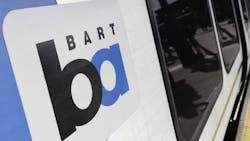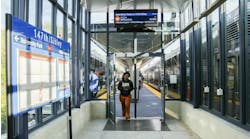FTA green lights BART’s Transbay capacity project to enter CIG Program’s engineering phase
The Federal Transit Administration (FTA) has given clearance for Bay Area Rapid Transit (BART) Transbay Corridor Core Capacity Project to enter the engineering phase of the FTA’s Capital Investment Grant (CIG) Program.
BART says the approval means it is “one step closer to increasing the number of trains operating through the Transbay Tube and lengthening peak hour trains in a program designed to relieve crowding.”
"We are pleased to allocate funding to San Francisco’s Transbay project," said FTA Acting Administrator K. Jane Williams. "This project will allow BART to operate up to 30 trains per hour through the Transbay Tube, helping to alleviate crowding and accommodate growing ridership."
BART currently operates 23 trains per hour cars in each direction through the Transbay Tube between San Francisco and Oakland during peak commute hours. With further ridership increases expected, BART is working to expand to 30 ten-car trains in each direction per hour with the Transbay Corridor Core Capacity Project.
The project includes four elements:
• Additional rail cars: 306 additional railcars to provide the trains needed to increase capacity.
• Train control modernization: A new communications-based train control (CBTC) system that will allow more trains per hour through the Transbay Tube.
• New railcar storage yard: To accommodate the additional 306 rail cars needed for higher frequency service, BART will build a new storage yard on BART-owned property at the Hayward Maintenance Complex.
• Traction power substations: With more frequent and longer trains, BART will need to enhance the electrical system that powers them by building five new substations in San Francisco and the East Bay.
A spotlight was placed on the project’s need in late May when a fatal road accident closed the Bay Bridge in San Francisco, pushing an additional 10,000 riders onto BART’s system between Oakland and San Francisco.
In the FTA’s annual report on the CIG Program released in March, BART’s Transbay Corridor Core Capacity Project received the highest overall project rating in the country.
The total cost of the Transbay Core Capacity Project is $3.5 billion with approximately $1.5 billion in local funds already committed. Measure RR is providing $460 million to the project, Regional Measure 3 adopted in 2018 is providing $500 million and $318 million comes from the California State Transportation Agency’s Transit and Intercity Rail Capital Program (TIRCP).
BART says the FTA will allocate $300 million toward the project and by advancing the project into the engineering phase, BART is closer to getting the full $1.17 billion it is requesting. BART anticipates a Full Funding Agreement will be executed in December 2019.
“We want to take this opportunity to thank House Speaker Nancy Pelosi and Senator Dianne Feinstein for their unwavering support as BART works to secure this vital funding. FTA Acting Administrator Jane Williams and her team have been extraordinary partners to work with. Our regional economy is intricately tied to our ability to move more people through this crucial corridor,” says BART General Manager Grace Crunican. “BART and the Trump Administration are focused on investing in and improving infrastructure as rebuilding transportation systems, along with our roads and bridges, benefits everyone.”
"This investment in public transportation infrastructure will improve mobility for the many riders who depend on public transit every day in the Bay Area," said U.S. Transportation Secretary Elaine L. Chao.
“I’m pleased that Secretary Chao is allowing this project to move forward,” U.S. Sen. Dianne Feinstein (D-CA) said. “BART carries more than twice as many passengers between Oakland and San Francisco as the Bay Bridge. Its expansion is an absolutely crucial step to reduce traffic congestion in the Bay Area, and it’s long overdue to receive an upgrade. I’m hopeful that there will be no further delays to this project and it will move ahead on schedule.”
With this announcement, FTA says it has advanced funding for 23 new CIG projects throughout the nation since January 20, 2017, totaling approximately $6.3 billion in funding commitments.

Mischa Wanek-Libman | Group Editorial Director
Mischa Wanek-Libman is director of communications with Transdev North America. She has more than 20 years of experience working in the transportation industry covering construction projects, engineering challenges, transit and rail operations and best practices.
Wanek-Libman has held top editorial positions at freight rail and public transportation business-to-business publications including as editor-in-chief and editorial director of Mass Transit from 2018-2024. She has been recognized for editorial excellence through her individual work, as well as for collaborative content.
She is an active member of the American Public Transportation Association's Marketing and Communications Committee and served 14 years as a Board Observer on the National Railroad Construction and Maintenance Association (NRC) Board of Directors.
She is a graduate of Drake University in Des Moines, Iowa, where she earned a Bachelor of Arts degree in Journalism and Mass Communication.

